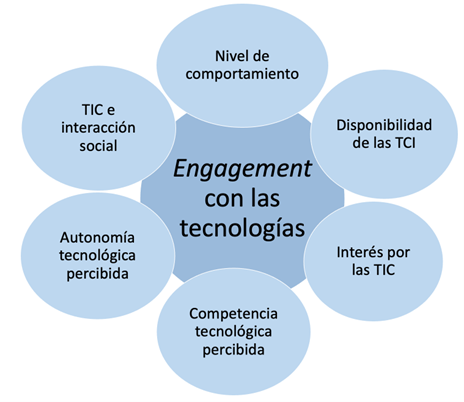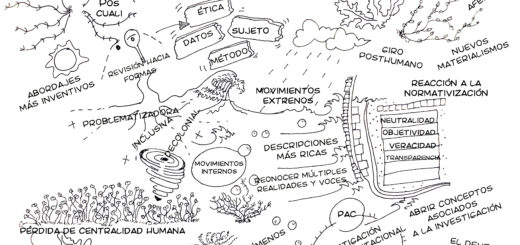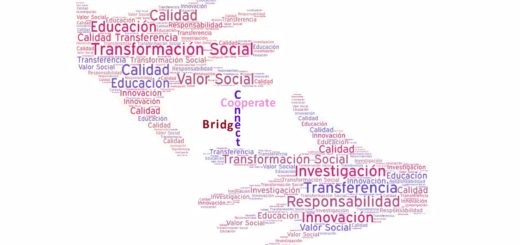Does technology influence student engagement?
The concept of engagement with technologies integrates factors such as the level of behavior, ICT availability, interest, competence and perceived technological autonomy, in addition to technologies as a means of social interaction (see Figure 1).
Basically, engagement with ICTs is reflected in students’ manifest behavior with the use of technologies, as well as by cognitive and motivational factors that favor ICT-mediated activities (García-Hernández, 2020).

Figure 1. Technology and its influence on engagement
Behavioral level
The behavioral level represents the frequency of ICT use and the amount of time spent using ICT. Since ICT is also embedded in more informal learning environments, such as students’ homes and other places where students engage in learning activities (e.g. in a park with a smartphone), the use and availability of ICT outside the classroom needs to be recognized by the teacher (Goldhammer et al., 2016).
ICT availability
Students must be able to access and use ICT, the use of which may be restricted both at school (e.g., computers are available only in lab rooms) and at home. Therefore, the availability and usability of digital devices are necessary conditions for generating engagement (Schuh et al., 2018).
Interest in ICT
Interest in ICT is understood as a motivational disposition: that is, the long-term preference of individuals to deal with ICT-related topics, tasks, or activities. It can increase the quality of teaching; encourage the use of learning strategies, facilitate deep processing, and enhance the quality of the learning experience (Nyanja & Musonda, 2020).
Following Schiefele (1991), there are two intrinsic components about interest in ICT. The first one is related to the (positive) feelings that are associated with a certain subject area or technological tool, an example of this is the item asked by OECD (2016) in the ICT familiarity questionnaire, “I forget about time when I am using digital devices”.
The second component is related to the importance that the student gives to ICT for the development of personality and their skills for understanding relevant problems, for example: “The Internet is a great resource for obtaining information”.
Perceived technological competence
Perceived technological competence is conceptualized as the student’s perception of his or her own knowledge about ICT and how to use it (ICT skills). It describes a person’s notions and beliefs about his or her computer and ICT knowledge and skills, such as how to handle everyday computing situations (Janneck et al., 2013)
Perceived technological autonomy
This ICT participation factor reflects the individual’s perceived control and self-direction in technology-related activities. Autonomy represents the fundamental need to self-organize behavior and experience, as well as to initiate activities that are congruent with personal values and goals. Students who have engagement with technology experience a feeling of controlling ICT use and self-initiating ICT-related activities, rather than being controlled by external factors (Christoph et al., 2015).
ICT as a medium of social interaction
ICT as a medium of interaction is understood in terms of social relationship: that is, connection with others. More specifically, social relationship in the ICT domain refers to the personal need to share ICT interest, knowledge, experiences, and activities with others making ICT a subject of interpersonal communication and interaction. Unlike ICT interest, this motivational aspect is more directed to other people and social situations through ICT experiences, where concerns can be exchanged (Rodrigues & dos Santos, 2019).
References
Christoph, G., Goldhammer, F., Zylka, J., & Hartig, J. (2015). Adolescents’ computer performance: The role of self-concept and motivational aspects. Computers & Education, 81(1), 1-12. https://doi.org/10.1016/j.compedu.2014.09.004
Connor, R., Travis, G., Peace, K. M., Propper, B. W., Hale, D. F., Alseidi, A. A., & Vreeland, T. J. (2020). Using technology to maintain the education of residents during the COVID-19 pandemia. Journal of Surgical Education, 77(4), 729-732. https://doi.org/10.1016/j.jsurg.2020.03.018
García-Hernández, A. (2020). Diseño y evaluación del impacto de un e-textbook en el engagement hacia el aprendizaje de la Matemática Discreta [Tesis Doctoral, Universidad de Sevilla]. https://idus.us.es/handle/11441/105481
Goldhammer, F., Gniewosz, G., & Zylka, J. (2016). ICT engagement in learning environments. En S. Kuger (Ed.), Assessing Contexts of Learning. Methodology of Educational Measurement and Assessment (pp. 331-351). Springer International Publishing. https://doi.org/10.1007/978-3-319-45357-6
Janneck, M., Vincent-Hoeper, S., & Ehrhardt, J. (2013). The computer-related self concept: A gender-sensitive study. International Journal of Social and Organizational Dynamics in IT, 3(3), 1-16. https://doi.org/10.4018/ijsodit.2013070101
Nyanja, N., & Musonda, E. (2020). A review of the ICT subject implementation in schools: a perspective of Lusaka Province (Zambia) [Una revisión de la implementación del tema de las TIC en las escuelas: una perspectiva de la provincia de Lusaka (Zambia)]. Education and Information Technologies, 25, 1109–1127. https://doi.org/10.1007/s10639-019-10014-4
Rodrigues, M. I., & dos Santos, L. R. (2019). Conceptions of science teachers about the use of ICT in teaching practice [Concepciones de los profesores de ciencias sobre el uso de las TIC en la práctica docente.]. Prometeica – Revista de Filosofía y Ciencias, 19, 58-71. https://doi.org/10.34024/prometeica.2019.19.9460
Schiefele, U. (1991). Interest, learning, and motivation. Educational Psychologist. Educational Psychologist, 26(3-4), 299-323. https://doi.org/10.1080/00461520.1991.9653136
Schuh, K. L., van Horne, S., & Russell, J. E. (2018). E-textbook as object and mediator: interactions between instructor and student activity systems [Libro de texto electrónico como objeto y mediador: interacciones entre el instructor y los sistemas de actividad del alumno]. Journal of Computing in Higher Education, 30(2), 298-325. https://doi.org/10.1007/s12528-018-9174-4

Author:
Alién García Hernández
Grupo de investigación, Evaluación y Tecnología Educativa. Universidad de Sevilla






